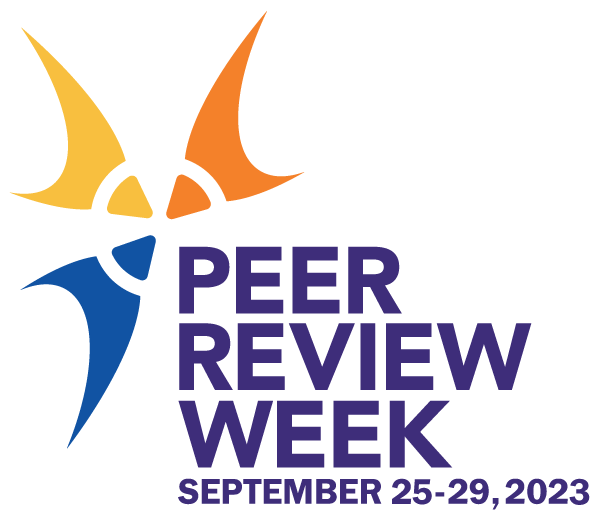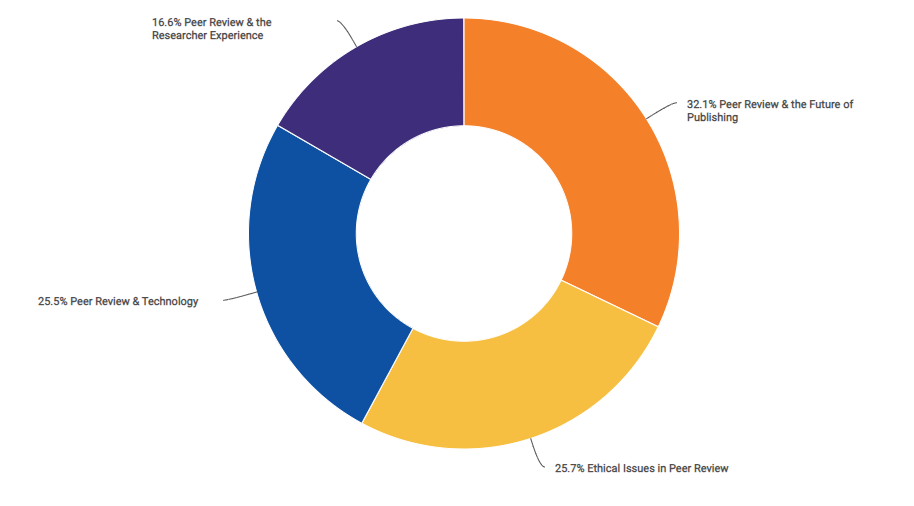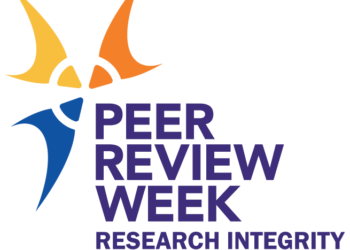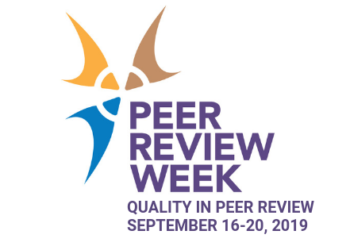Editor’s note: Today’s guest post is by the Co-Chairs of this year’s Peer Review Week Steering Group. Roohi Ghosh is the Ambassador for Researcher Outreach, Engagement, and Success at CACTUS. Lindsay Morton is a Senior Communications Manager of Open Science Community Engagement at PLOS.
Peer Review Week (September 25-29, 2023) is an annual global event exploring and celebrating the essential role of peer review in evaluating the rigor, credibility, and potential interest of research submitted for publication consideration. This year’s Peer Review Week theme is “Peer Review and the Future of Publishing.”

The evolving landscape of the scholarly review process
Scholarly publishing is in the midst of seismic, transformational change, and faces pressure from many different directions. It’s no wonder that “The Future of Publishing” resonated so profoundly with the voters and stakeholders in our poll to select this year’s theme (details below).
It’s an unsettling time in what has been, for more than 350 years, a remarkably stable undertaking, with changes taking place in how research is conducted, the rise of Open Access (OA) and open science, the evolution of big data, Natural Language Processing (NLP), and Artificial Intelligence (AI), and more. Even the transition from analog to digital publishing represented more of a change of venue than a fundamental shift in the business models, norms, or values that have always sustained and guided scholarly publishing.
As we consider how to meet the challenges and take advantage of the opportunities of this moment in our industry, it makes sense also to reconsider how we manage peer review selection, how we gather expert feedback, and how we honor and reward reviewers. How can we make peer review easier and more fulfilling for reviewers, more efficient and effective for editors and publishers, and more trustworthy for everyone? How can we distribute the rewards and responsibilities of peer review more equitably?
It is imperative for stakeholders across the whole scholarly ecosystem to work together proactively to ensure that peer review keeps up with the evolving publishing landscape and remains our most powerful tool for evaluating the rigor, credibility, and interest of scholarly research.
The many, interconnected factors influencing the future of scholarly publishing, include:
Changes in how research is conducted
Collaboration is becoming increasingly common practice, both as a result of team science, and increased globalization. As research becomes more complex and cross-disciplinary, it is harder for a single Principal Investigator (PI) to oversee and execute all aspects of the work they are leading. To meet the challenges of big, multifaceted investigations, researchers must work together as a team, with two or more equal partners taking on the responsibilities of a senior researcher within their specific areas of expertise. Assessing broader, more diverse research outputs requires broader, more diverse expertise.
Increasingly, these collaborations are global. According to the National Science Board, the percentage of science and engineering articles published with international research collaborations (including authors from at least two countries) increased from 17% to 23% between 2008 and 2018. As of 2018, science and engineering articles had high rates of international collaborations, including: the UK (62%), Australia (60%), France (59%), Canada (56%), Germany (53%), Spain (53%), and Italy (50%).
Our publishing infrastructure lags behind modern research practices in many ways. Can two reviewers with similar research backgrounds fully assess multidisciplinary work? Are current publisher networks representative of the expanded author pool? How do we allocate academic credit for authors and reviewers alike in a way that reflects collaborative rather than hierarchical professional relationships?
The rise of Open Access and Open Science
OA has been a part of the scholarly publishing ecosystem for more than two decades, with a significant but minority market share. Recently, however, the growth of OA publishing — and the adoption of adjunct Open Science practices such as data sharing, code sharing, preprint posting, and open peer review — appears to have accelerated. This increase in open scholarship is driven by researchers’ goals and priorities, as well as by public policy changes, funder mandates, and the influence of the Sars-CoV-2 pandemic. In the face of these pressures, both subscription model journals and fee-per-publication OA journals must find financially viable ways to provide equitable access to both published research and publishing services.
At the same time, non-article research outputs like data, methods, and code are gaining prominence. New journals and services are emerging to house and preserve these assets, making them into citable publications in their own right—and opening new questions about review and assessment standards and best practices.
Big data, natural language processing, and artificial intelligence
Big data analytics, NLP, and AI have the potential to reshape the scholarly review process. These transformative technologies can revolutionize how we manage and evaluate the publishing pipeline and improve the efficiency of peer review. But there are ethical considerations as well.
Big data analytics has made it possible to process and analyze vast amounts of scholarly content, including articles, citations, and reviewer data. It can help to streamline the review process and create new opportunities for automation, allowing for faster manuscript assessments and reducing publication bottlenecks. For instance, automated tools can assist with the preliminary identification of relevant literature, plagiarism, image manipulation, and fraud, and perform grammar and language checks. Machine learning algorithms can analyze patterns and structures in scholarly content to highlight potential weaknesses in arguments, methodology, or data analysis. Improved data processing can assist journals and publishers in the identification of emerging trends, submission patterns, and connections that may not be immediately apparent otherwise. These operational efficiencies free reviewers to focus their expertise on the research, where it is needed most. In what other ways might AI technologies assist in providing valuable feedback and identifying key areas for improvement, and how might that change the reviewer role?
At the same time, there are important ethics considerations when utilizing AI, including in the review process. For example, potential bias in the underlying algorithms or training data might introduce discrimination into the editorial screening or review process. What ethical considerations should be taken into account when utilizing AI and NLP technologies in the review process, and how do we ensure that it continues to become more equitable and inclusive, rather than less?
Peer Review and the Future of Publishing
Underlying and parallel with these changes is another long-term pain point: the increasing demands on peer reviewers, and challenges inherent in the peer review process and experience.
More scholarly articles and more different types of scholarly research outputs are entering the literature all the time. Publishers report sending more reviewer invitations to secure the same number of reviews. Some reviewers report receiving overwhelming numbers of requests to review, including being invited to review the same article for different journals — all while balancing this with the need to prioritize their own research. Clearly, continuing with the status quo is unsustainable in the long run.
Looking ahead to Peer Review Week
In order to ensure that Peer Review Week 2023 addresses the most pressing issues and reflects the needs and interests of the scholarly community, the Peer Review Week Committee sought input from stakeholders in selecting the theme for this year’s event. More than 870 members of our community voted on the theme, with 32.1% of respondents selecting “Peer Review and the Future of Publishing.”

The theme this year is broad but timely. It invites us to look around, reflect on the changes taking place, and consider the implications. It’s also a chance to envision the future we want. We hope that this Peer Review Week will provide an opportunity for our community and the researchers we serve to come together and engage in thoughtful discussion around what we hope the future of publishing might look like, and the role of peer review in that future. After all, the changes we now face impact all journals — whether our publications originated as letters between nineteenth-century scientists, or were born digital earlier in this century; whether we use a subscription model, or an APC; whether we conduct peer review in complete anonymity, complete transparency, or somewhere in between.
We look forward to seeing the many different trends you observe, the “Futures” you envision, and the new directions in which you take this years’ theme!
Get involved in Peer Review Week 2023
We invite everyone to participate in Peer Review Week 2023, in the capacity that makes the most sense for them—join the Steering Committee, host a live event or webinar, delve into the themes in a blog or editorial—or something else!
To volunteer for the Steering Committee, email contactprweek@gmail.com. To have your content or events promoted through our web or social channels complete this form.



